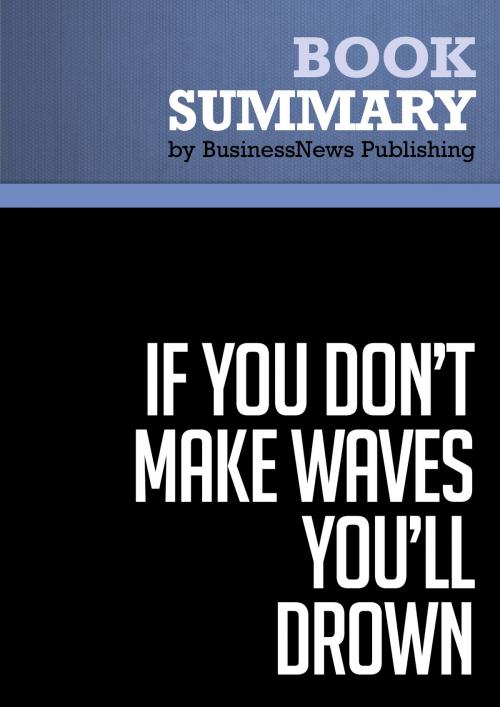Summary: If You Don't Make Waves You'll Drown - Dave Anderson
Business & Finance, Economics, Development & Growth, Management & Leadership, Management| Author: | BusinessNews Publishing | ISBN: | 9782806247148 |
| Publisher: | Must Read Summaries | Publication: | February 15, 2013 |
| Imprint: | Business Book Summaries | Language: | English |
| Author: | BusinessNews Publishing |
| ISBN: | 9782806247148 |
| Publisher: | Must Read Summaries |
| Publication: | February 15, 2013 |
| Imprint: | Business Book Summaries |
| Language: | English |
This work offers a summary of the book “IF YOU DON’T MAKE WAVES YOU’LL DROWN: 10 Hard-Charging Strategies for Leading in Politically Correct Times” by Dave Anderson.
Political correctness, Dave Anderson believes, is draining the health and vitality out of many businesses, because it encourages managers to patronise weak performers, thus dis-incentivising employees to achieve more. It praises conformity rather than innovation. Instead, companies should create an environment where high-performance is celebrated, and exceptional results are applauded.
Anderson puts forward a radical programme to get the full potential of every employee. He suggests that executives stop trying to make everyone happy: always treat people with respect, but give them expectations, and celebrate those who meet those expectations. Always be honest with people, and be specific in your feedback. Never give across the board bonuses: they should be performance-based. Think about your own role as a thermostat rather than a thermometer – you should be controlling the business environment, not passively standing by. Ideally, business processes should be structured to avoid burnout, so that you don’t sacrifice long-term productivity for short-term speed.
If You Don’t Make Waves You’ll Drown sets out a manifesto for improving company performance, and increasing morale. By following his plan, employees will be motivated to perform better, and will reap benefits themselves.
Political correctness, Dave Anderson believes, is draining the health and vitality out of many businesses, because it encourages managers to patronise weak performers, thus dis-incentivising employees to achieve more. It praises conformity rather than innovation. Instead, companies should create an environment where high-performance is celebrated, and exceptional results are applauded.
Anderson puts forward a radical programme to get the full potential of every employee. He suggests that executives stop trying to make everyone happy: always treat people with respect, but give them expectations, and celebrate those who meet those expectations. Always be honest with people, and be specific in your feedback. Never give across the board bonuses: they should be performance-based. Think about your own role as a thermostat rather than a thermometer – you should be controlling the business environment, not passively standing by. Ideally, business processes should be structured to avoid burnout, so that you don’t sacrifice long-term productivity for short-term speed.
If You Don’t Make Waves You’ll Drown sets out a manifesto for improving company performance, and increasing morale. By following his plan, employees will be motivated to perform better, and will reap benefits themselves.
This work offers a summary of the book “IF YOU DON’T MAKE WAVES YOU’LL DROWN: 10 Hard-Charging Strategies for Leading in Politically Correct Times” by Dave Anderson.
Political correctness, Dave Anderson believes, is draining the health and vitality out of many businesses, because it encourages managers to patronise weak performers, thus dis-incentivising employees to achieve more. It praises conformity rather than innovation. Instead, companies should create an environment where high-performance is celebrated, and exceptional results are applauded.
Anderson puts forward a radical programme to get the full potential of every employee. He suggests that executives stop trying to make everyone happy: always treat people with respect, but give them expectations, and celebrate those who meet those expectations. Always be honest with people, and be specific in your feedback. Never give across the board bonuses: they should be performance-based. Think about your own role as a thermostat rather than a thermometer – you should be controlling the business environment, not passively standing by. Ideally, business processes should be structured to avoid burnout, so that you don’t sacrifice long-term productivity for short-term speed.
If You Don’t Make Waves You’ll Drown sets out a manifesto for improving company performance, and increasing morale. By following his plan, employees will be motivated to perform better, and will reap benefits themselves.
Political correctness, Dave Anderson believes, is draining the health and vitality out of many businesses, because it encourages managers to patronise weak performers, thus dis-incentivising employees to achieve more. It praises conformity rather than innovation. Instead, companies should create an environment where high-performance is celebrated, and exceptional results are applauded.
Anderson puts forward a radical programme to get the full potential of every employee. He suggests that executives stop trying to make everyone happy: always treat people with respect, but give them expectations, and celebrate those who meet those expectations. Always be honest with people, and be specific in your feedback. Never give across the board bonuses: they should be performance-based. Think about your own role as a thermostat rather than a thermometer – you should be controlling the business environment, not passively standing by. Ideally, business processes should be structured to avoid burnout, so that you don’t sacrifice long-term productivity for short-term speed.
If You Don’t Make Waves You’ll Drown sets out a manifesto for improving company performance, and increasing morale. By following his plan, employees will be motivated to perform better, and will reap benefits themselves.















